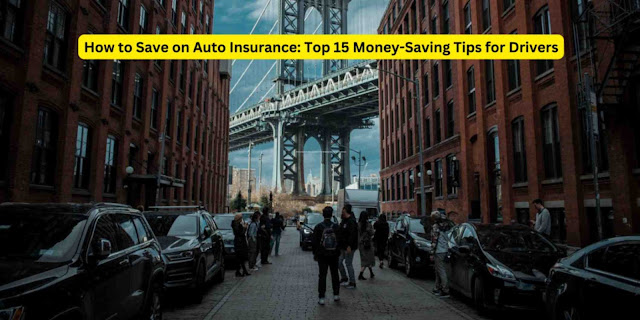Auto insurance is a necessary expense for drivers, providing essential financial protection in the event of accidents or unforeseen incidents on the road. While it's crucial to have sufficient coverage, many drivers are looking for ways to save on their auto insurance premiums without compromising on protection. In this article, we will explore the top money-saving tips for drivers, helping them find the most cost-effective auto insurance options while still maintaining adequate coverage.
1. Shop Around and Compare Quotes
One of the most effective ways to save on auto insurance is to shop around and compare quotes from multiple insurance providers. Rates can vary significantly from one company to another, so getting quotes from different insurers allows drivers to find the best coverage at the most competitive price. Online comparison tools make it easier than ever to obtain quotes and compare different policy options side by side.
2. Bundle Insurance Policies
Discounts are often provided by insurance companies to customers who bundle multiple insurance policies together. By combining auto insurance with other policies like home or renter's insurance, drivers can often save on premiums. Bundling policies not only saves money but also simplifies insurance management, as all policies are held with a single provider.
3. Maintain a Good Driving Recor
A clean driving record is a significant factor that insurers consider when determining premiums. Drivers with a history of safe driving, free from accidents and traffic violations, are perceived as lower risk and are likely to qualify for lower insurance rates. Obeying traffic laws and driving responsibly can help maintain a good driving record and lead to potential cost savings.
4. Opt for a Higher Deductible
The deductible is the amount a driver must pay out of pocket before insurance coverage kicks in. Choosing a higher deductible can result in reduced premiums. However, drivers should carefully consider their ability to pay the deductible in the event of a claim. Choosing a deductible that strikes a balance between saving on premiums and affordability is crucial.
5. Consider Usage-Based Insurance
Usage-based insurance (UBI), also known as pay-as-you-go or telematics insurance, uses technology to track a driver's behavior and driving habits. Insurance premiums are then based on actual driving data rather than traditional risk factors. UBI can be an excellent option for safe drivers or those who drive infrequently, as it rewards good driving behavior with potential discounts.
6. Take Advantage of Discounts
Insurance companies offer various discounts that can help drivers save on premiums. Some common discounts include:
- Safe Driver Discount: Incentive for upholding a spotless driving history.
- Multi-Policy Discount: Discount for bundling multiple policies with the same insurer.
- Good Student Discount: Offered to students with good academic records.
- Safety Feature Discount: Discount for vehicles equipped with safety features such as anti-lock brakes and airbags.
- Anti-Theft Device Discount: Given to vehicles with anti-theft devices installed.
- Low Mileage Discount: Available to drivers with lower annual mileage.
7. Review Coverage Needs Periodically
As life circumstances change, so do insurance needs. Periodically reviewing coverage needs can help drivers ensure they have the appropriate amount of coverage at the right price. For example, if a car's value depreciates significantly over time, it may be worth considering reducing collision and comprehensive coverage to save on premiums.
8. Consider Usage-Based Insurance
Usage-based insurance (UBI) involves using telematics technology to monitor a driver's behavior, such as their speed, braking habits, and mileage. Insurance companies utilize this data to calculate insurance premiums. Safe drivers who exhibit responsible driving habits can potentially save money with UBI.
9. Take Defensive Driving Courses
Undergoing a defensive driving course may result in insurance discounts. These courses teach drivers essential defensive driving skills and techniques to avoid accidents and reduce risks on the road.
10. Avoid Unnecessary Coverage
While it's essential to have adequate coverage, there may be some optional coverage types that drivers can forgo. For instance, if a driver has comprehensive health insurance that covers medical expenses resulting from an accident, they might not need extensive medical payments coverage.
11. Seek Low-Mileage Discounts
Some insurance providers offer discounts to drivers who drive fewer miles annually. If a driver uses their vehicle infrequently or has a short commute, they may qualify for a low-mileage discount.
12. Install Safety Features
Vehicles equipped with safety features such as anti-lock brakes, airbags, and anti-theft devices are generally safer and less prone to accidents or theft. As a result, insurers often offer discounts to drivers with safety-equipped vehicles.
13. Pay Premiums in Full
Some insurers offer discounts to drivers who pay their premiums in full upfront, rather than in monthly installments. If a driver can afford to pay the full premium at the beginning of the policy term, they may benefit from this discount.
14. Avoid Frequent Claims for Minor Incidents
Filing frequent claims for minor incidents can lead to higher premiums in the long run. It's advisable to handle minor repairs and expenses out of pocket whenever possible to maintain a lower insurance premium.
15. Check for Affinity Group Discounts
Certain organizations, alumni associations, and professional groups have partnerships with insurance companies that offer discounts to their members. Drivers should check if they qualify for any affinity group discounts.
Final Thought
Saving on auto insurance is possible with careful consideration of coverage needs, comparison shopping, and taking advantage of available discounts. Drivers should review their policies periodically, maintain a clean driving record, and explore various ways to lower their premiums without compromising on essential coverage.
By being proactive and informed, drivers can strike a balance between cost savings and protecting themselves and their vehicles on the road. Remember, each driver's insurance needs are unique, so finding the best money-saving strategy involves tailoring coverage to fit individual circumstances.
